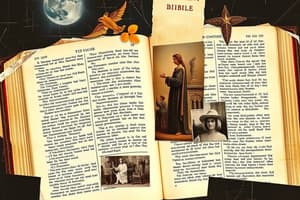Podcast
Questions and Answers
What is the Latin term for 'Bible'?
What is the Latin term for 'Bible'?
- Biblos
- Codex
- Biblia (correct)
- Vulgate
Which of the following languages was NOT used in the writing of the Bible?
Which of the following languages was NOT used in the writing of the Bible?
- Latin
- Old English (correct)
- Koine Greek
- Hebrew
The first full copy of the Bible was published around A.D. ____.
The first full copy of the Bible was published around A.D. ____.
312
What does the term 'Canon' refer to in biblical context?
What does the term 'Canon' refer to in biblical context?
The Vulgate is the first compiled New Testament.
The Vulgate is the first compiled New Testament.
Who translated the Bible into Latin?
Who translated the Bible into Latin?
What is the name given to the story of the first creation?
What is the name given to the story of the first creation?
Match the following classifications with their descriptions:
Match the following classifications with their descriptions:
What was the forbidden fruit in the Garden of Eden?
What was the forbidden fruit in the Garden of Eden?
The story of Adam and Eve highlights the importance of obedience.
The story of Adam and Eve highlights the importance of obedience.
The Hebrew Tribe considered the number ____ as perfect.
The Hebrew Tribe considered the number ____ as perfect.
What does the term 'Anti ecology' refer to in the context?
What does the term 'Anti ecology' refer to in the context?
Flashcards are hidden until you start studying
Study Notes
The Bible
- A collection of 66 books (Protestants) or 73 books (Roman Catholics) written by over 40 authors over 1500 years.
- The term "Bible" comes from the Latin "biblia" and Greek "biblos", meaning "books" or "library."
- Written in three languages: Hebrew, Koine Greek, and Aramaic.
- Originally written on scrolls of papyrus, later parchment, and then the codex (old book) format.
The Canon
- A list of books accepted as authentic and inspired by God, reflecting a standard of measurement.
- "Canonical Books" are considered "divinely inspired," while "Apocrypha" books did not pass the standard, but are still valued by some.
Old and New Testaments
- Old Testament: Primarily written in Hebrew, with small sections in Aramaic.
- New Testament: Written in Greek.
- Both testaments are considered "inspired word of God" or "God-breathed."
Five Mighty Acts of God: Creation
- Genesis: The beginning, focusing on the first and second creations.
- First Creation (6 Days of Creation): Emphasizes God's transcendence (distance, invisibility) and the role of Ruac/Rua (breath, spirits) in creation.
- Dominion: Humans are given stewardship (caretaking) responsibilities over Earth.
- Elohim: The term used by the Northern Kingdom (Israel) to refer to God.
- Second Creation (First Man and Woman): Focuses on the creation of Adam and Eve, emphasizing the concept of anthropocentrism (human qualities attributed to God).
- Garden of Eden: Represents the perfection of God's creation.
- The Fall: Adam and Eve's disobedience to God's command by eating the forbidden fruit from the Tree of Knowledge of Good and Evil highlights the theme of free will, temptation, and the consequences of sin.
Myths
- Vessels of Timeless Truths: Myths within the Bible carry profound truths passed down through generations orally.
- Hebrew Tribe: The number 7 held significant meaning as a perfect number.
Five Mighty Acts of God: Governance
- God established governance through appointed leaders, emphasizing the importance of leadership in the community.
- The Bible was written in a patriarchal context, with men holding leadership roles.
- Patriarchal Society: Male leadership is emphasized.
- Matriarchal Society: Female leadership is emphasized.
- After "The Fall," God chose individuals to guide and rule communities.
The Fall: Man Fell from the Grace/Abundance of God
- The Fall of Man represents the separation of humanity from God due to sin.
- The story of Adam and Eve highlights the consequences of disobedience, temptation, and the loss of innocence.
Studying That Suits You
Use AI to generate personalized quizzes and flashcards to suit your learning preferences.




